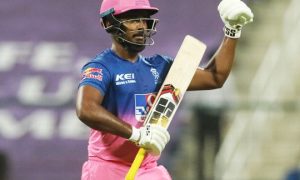In a letter to the states and Union Territories, Union Health Secretary Rajesh Bhushan advised implementing strategic interventions for containment like imposition of night curfew, strict regulation of large gatherings, curtailing numbers in marriages and funerals besides increasing testing and surveillance.
NEW DELHI: Amid rising cases of Omicron, the Centre has asked states and union territories to “activate” war rooms, keep analyzing even small trends and surges and keep taking strict and prompt containment action at district and local levels in order to curb the “highly transmissible” new COVID variant.
In a letter to the states and Union Territories, Union Health Secretary Rajesh Bhushan advised implementing strategic interventions for containment like imposition of night curfew, strict regulation of large gatherings, curtailing numbers in marriages and funerals besides increasing testing and surveillance.
Union Health Secretary’s letter highlights measures that need to be taken in view of initial signs of surge in cases of COVID-19 as well as increased detection of the variant of concern Omicron in different parts of the country.
“At the district level there should be constant review of emerging data regarding the population affected by COVID-19, geographical spread, hospital infrastructure and its utilization, manpower, notifying containment zones, enforcement of perimeter of containment zones etc. This evidence should be the basis for effective decision making at the district level itself,’’ the letter reads.
“Such a strategy ensures that infection is contained at the local level itself before it spreads to other parts of the state,” Bhushan said in the letter.
“Kindly activate the war rooms/EOCs (emergency operation centres) and keep analyzing all trends and surges, no matter how small and keep taking proactive action at the district/local level. Regular reviews with field officers and proactive action in this regard will definitely control the spread of infection and flatten the curve,” he said.
In the case of all new clusters of Covid positive cases, prompt notification of “containment zones”, “buffer zones” should be done, strict perimeter control of containment zone according to extant guidelines must be ensured.
Genome sequencing of COVID samples
All cluster samples must be sent to INSACOG Labs for Genome Sequencing without delay, Bhushan underlined.
The letter highlighted that test positivity of 10 per cent or more in the last one week or bed occupancy of 40 per cent or more on oxygen supported or ICU beds should be the main elements of the framework to be used by states and union territories to facilitate decision making at the district level.
“Based on current scientific evidence, the VOC (a variant of concern) Omicron is at least 3 times more transmissible than the Delta VOC. Besides, the Delta VOC is still present in different parts of the country.
“Hence, even greater foresight, data analysis, dynamic decision making and strict and prompt containment action is required at the local and district level. The decision making at the state and UT and district level must be very prompt and focussed,” he said.
Test, track, surveillance
Listing some of the strategic areas of intervention focusing on containment, test, track, surveillance, clinical management to be taken, Bhushan asked states and union territories to ensure door to door case search, testing of all SARI/ILI and vulnerable/co-morbid people and right proportion of RT PCR tests in total tests being conducted daily.
Contact tracing of all Covid positive persons and utilizing the access to “AIR SUVIDHA Portal by State Surveillance Officers (SSOS) and District Surveillance Officers (DSOS) to monitor the international passengers who have arrived in their states and districts was also stressed.
States and union territories have been asked to increase bed capacity, other logistics like ambulances, mechanism for seamless shifting of patients, availability and operational readiness of oxygen equipment, buffer stock of drugs to be ensured by prompt utilization of Emergency Covid Response Package (ECRP-II) funds released by
Speeding up vaccination
The states and union territories have been asked to ensure 100 per cent coverage of left out first and second dose eligible beneficiaries in an accelerated manner. Special focus to be given to those districts where the first second dose coverage is less than the national average, the letter stated, adding the door-to-door vaccination campaign need to be strengthened.
They have also been asked to ensure advance engagement and information so that there is no misinformation or panic, transparent communication on hospital and testing infrastructure availability, regular press briefings etc.
In view of the Omicron surge, several states have imposed lockdown-like restrictions and banned public gatherings. Some of the states have also issued fresh guidelines about Christmas and New Year 2022 celebrations.
Karnataka: Sate’s Chief Minister Besavaraj Bommai has issued fresh guidelines for Christmas and New Year and said no parties or mass gatherings would be permitted in the state from December 30 to January 2. The state government also decided to prohibit mass gatherings in the city and other public places in the state. He also said no parties or events like having Disc Jockeys at clubs and restaurants would be allowed.
Maharashtra: In view of rising Omicron cases, the Brihanmumbai Municipal Corporation (BMC) urged the citizens to avoid gatherings and parties during the upcoming Christmas festival and New Year. BMC Commissioner Iqbal Singh Chahal has also warned of stringent action against those who flout rules. Chahal asked citizens to strictly adhere to rules regarding attendance at weddings and other functions. Moreover, the BMC has deployed squads at ward levels to take action against those who violate rules.
Delhi: The Delhi Disaster Management Authority (DDMA) has extended the COVID restrictions such as the ban on social and cultural gatherings and the cap on bars and restaurants to operate with 50 per cent of seating capacity. Notably, these curbs have been extended till December 31 midnight. However, the DDMA said the currently permitted and restricted activities in Delhi will continue up to the intervening night (12.00 hrs) of December 31 and January 1.
Under a phased reopening with an improved COVID-19 situation in the city, the DDMA has permitted most of the activities. However, political, social, cultural, religious and such other gatherings are still not permitted. Apart from the cap of 50 per cent of seating capacity on bars and restaurants, the order also continued the restriction on banquet halls to hold events other than meetings and conferences, exhibitions and marriages.





































